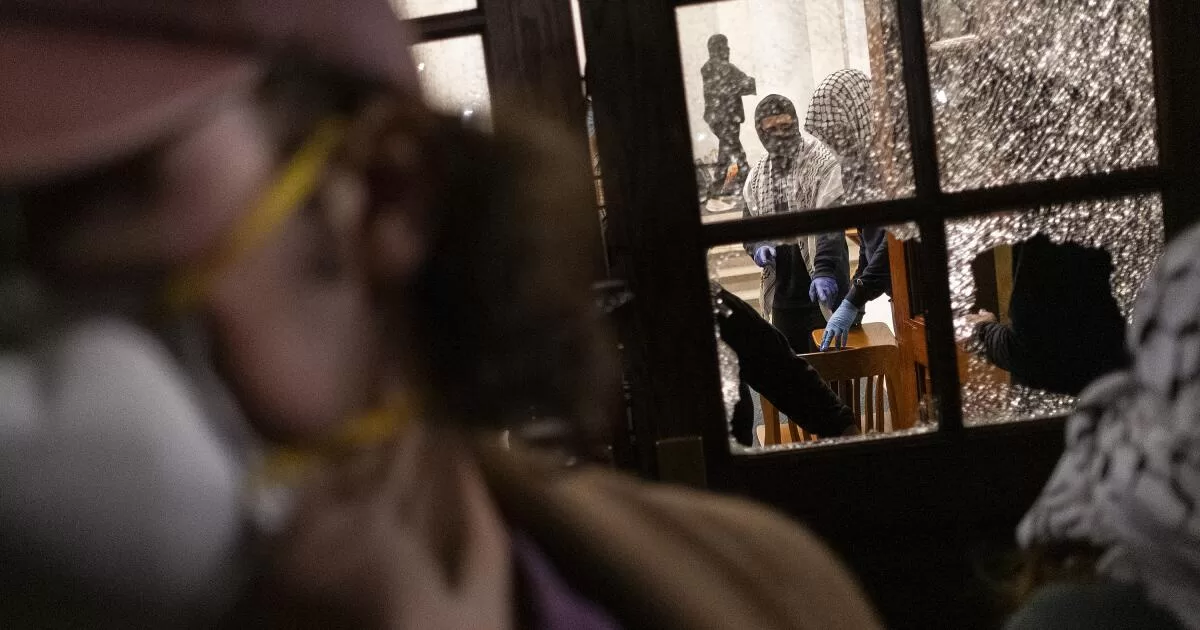Speaking in the hallway outside a Manhattan courtroom where his criminal hush money trial is taking place, Trump questioned whether student demonstrators who seized and barricaded a campus building early Tuesday, some of them vandalizing it in the process, would be treated the same way as his supporters who attacked the Capitol on Jan. 6 to try to block the certification of his election loss to Joe Biden.
“I think I can give you the answer right now,” he said. “And that’s why people have lost faith in our court system.”
Trump’s remarks demonstrate anew how he and the Republican Party have tried to minimize the deadliest assault on the seat of American power in more than 200 years, arguing that violent or criminal behavior by the left is a larger threat. Trump has called the Jan. 6 insurrectionists “unbelievable patriots” and has talked openly about the prospect of issuing pardons for those imprisoned if he wins a second term.
His comments come as he runs to reclaim the White House and is juggling dozens of felony charges in four criminal cases. The remarks underscore his claim that the charges against him are orchestrated by Democrats to keep him out of the White House and that he and his supporters are the targets of political persecution by a fundamentally corrupt justice system.
“They took over a building. That is a big deal,” Trump said of the Columbia protesters. “And I wonder if what’s going to happen to them will be anything comparable to what happened to J6, because they’re doing a lot of destruction, a lot of damages, a lot of people getting hurt very badly. I wonder if that’s going to be the same kind of treatment they gave J6. Let’s see how that all works out.”
More than 1,350 people have been charged with Jan. 6 riot-related federal crimes. Over 800 of them have been sentenced, with roughly two-thirds receiving terms of imprisonment ranging from a few days to 22 years. According to the Justice Department, 89 have pleaded guilty to federal felony charges of assaulting law enforcement officers. Five people died as a result of the Capitol attack, and more than 100 police officers were injured.
Legal scholars and political scientists said Trump’s strategy could help his campaign, but they point out there are stark differences between Jan. 6 and the campus protests against the Israel-Hamas war. College students have gathered in encampments at Columbia and other campuses to call for a cease-fire and demand their universities cut financial ties to Israel.
“The Columbia protests are not aimed at stopping the peaceful transition of power following an election, so they do not threaten the functioning of U.S. democracy,” said Richard Hasen, an expert in election law and professor at UCLA School of Law.
Hakeem Jefferson, an assistant professor of political science at Stanford University, said the demonstrations at a Columbia building that also was occupied during a civil rights protest in the 1960s reflect a long tradition of college students “pushing on the conscience” of their country.
“This is a tradition of protest. Disruptive, to be sure. Annoying to university administrators, to be sure,” Jefferson said. “To the contrary, what happened on January the 6th was a violent attempt to disrupt the peaceful transfer of power. There is no tradition of that in American history. It is unprecedented. And that is why we should, of course, treat it differently.”
Some of the recent campus protests have erupted into clashes with police, and hundreds of students have been arrested. Protesters in some parts of the country have hurled water bottles or other objects at officers, and police have deployed chemical agents to disperse crowds or carried them away amid screams.
Trump’s remarks build on a strategy of Republicans and conservative social media influencers to reframe the insurrection as part of an ongoing attempt to influence the public’s perception of Jan. 6. They have used the term to describe public demonstrations and even the 2020 election that put President Biden in the White House.
Some social media users Tuesday called the takeover of Columbia’s Hamilton Hall an “insurrection,” and said the media wouldn’t describe it that way because the views of the protesters aligned with the political left. Fox News used the reference in an article Tuesday about the student protesters, reporting that “the insurrection began at approximately 12:30 a.m.”
Legal experts note that the term “insurrection” has a specific meaning — a violent uprising that targets government authority — and that protests that do not involve an attempt to dismantle or replace a government shouldn’t be classified that way.
Tuesday was the second time in a week that Trump has compared the campus protests to past examples of right-wing violence.
Last week, he claimed the deadly 2017 rally in Charlottesville, Va., where torch-wielding white supremacists chanted, “Jews will not replace us,” was “nothing” compared with the antisemitism displayed at the campus protests.
“The hate wasn’t the kind of hate that you have here,” he said.
He returned to the reference in his comment outside court Tuesday, saying, “Charlottesville is peanuts compared to what you’re looking at now.”
The campus protests have pitted students against one another, and videos show instances of demonstrators making antisemitic remarks and violent threats. Some Jewish students say the hateful rhetoric has made them afraid to set foot on campus.
Meanwhile, organizers of the protests, some of whom are Jewish, say it is a peaceful movement aimed at defending Palestinian rights and protesting the war.
Columbia University on Tuesday said students who occupied Hamilton Hall — and were cleared by New York police Tuesday night — would face expulsion.
“Protesters have chosen to escalate to an untenable situation — vandalizing property, breaking doors and windows, and blockading entrances — and we are following through with the consequences we outlined yesterday,” said Ben Chang, the university’s spokesperson.
Swenson writes for the Associated Press. AP writer Melissa Goldin in New York contributed to this report.
